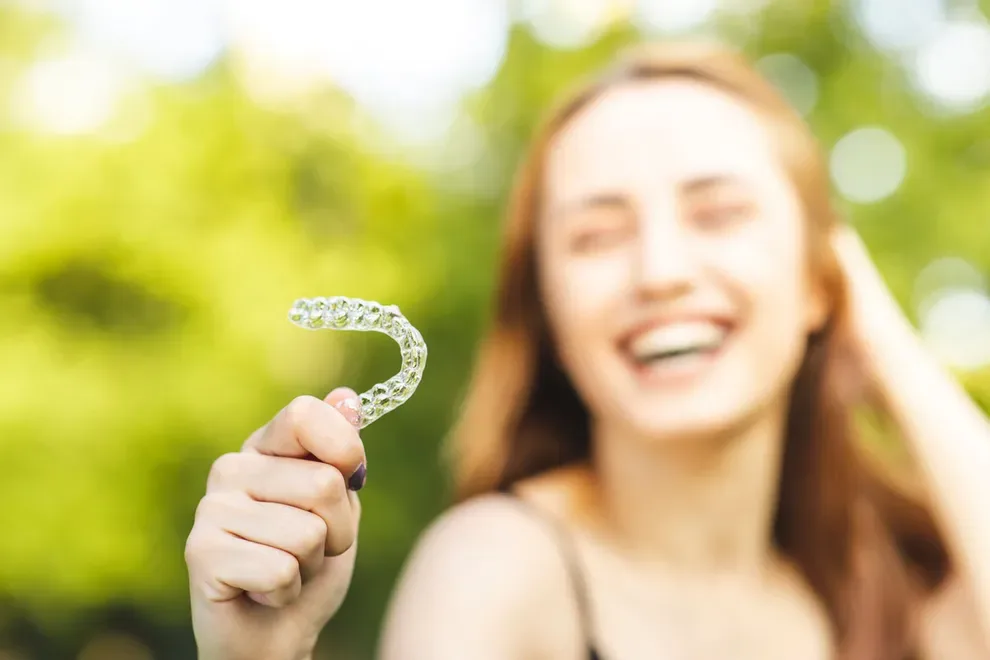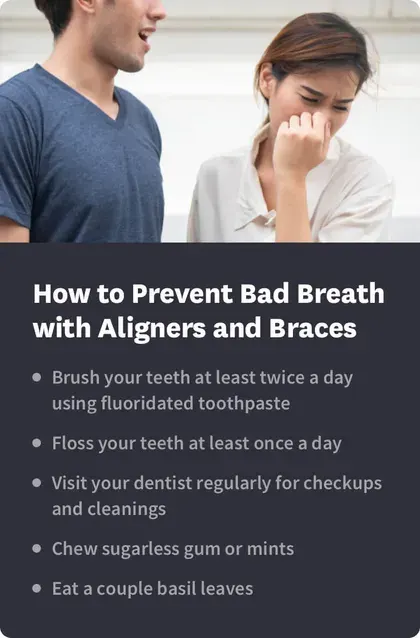Do Aligners and Braces Cause Bad Breath?

Table of Contents
- Do Aligners & Braces Cause Bad Breath?
- Why Does This Happen?
- Is Bad Breath a Sign of Other Issues?
- Alternative Causes
- Prevention
- How to Clean Braces & Aligners
- References
Bad breath is a common problem for people undergoing orthodontic therapy with braces or clear aligners. The ill-smelling exhales happen when you don’t practice good oral hygiene while wearing your appliances, causing excess bacteria to build up in your mouth. When this goes on for too long, it may cause you to develop gum disease and make the problem worse.
If you want to keep your breath fresh while wearing orthodontics, you will need to be extra vigilant about your oral hygiene routine. This includes brushing and flossing your teeth more often and cleaning your aligners regularly.
Do Aligners and Braces Cause Bad Breath?
Having orthodontic appliances in your mouth does not automatically lead to a wearer having bad breath. But it does make bad breath more likely.
Unless you have an injury to your teeth, gums or mouth that is trying to heal, foul breath is caused by a buildup of bacteria in the mouth. If you can keep your mouth clean at all times, odds are strong that you will never get bad breath. Unfortunately, being treated with braces or aligners sometimes promotes bacteria growth in the mouth.
There is some evidence to suggest that bad breath is slightly less likely with teeth aligners compared to braces. However, patients with both types of orthodontics experience bad breath more often than the general population.
Why Does This Happen?
There are two main reasons why braces and aligners can cause bad breath – they make oral hygiene difficult and they trap bits of food in your mouth.
Both types of orthodontics sit in your mouth all day and may make brushing and flossing inconvenient or difficult. Braces are especially troublesome because they are oddly shaped, have lots of corners and sharp angles that are difficult to clean, and cannot be removed. These things create the perfect environment for mouth bacteria to hide and thrive.
Because of the spider-web nature of the appliances, they tend to may trap food and drink particles that can be hard to flush out during routine brushing, flossing and rinsing. Wire braces are notorious for corralling food in their brackets. Saliva eventually breaks these bits of food down into sugars, and those sugars feed the bacteria in your mouth. This gives them plenty of energy to grow and reproduce, making bad breath more likely.
Is Bad Breath a Sign of Other Issues?

Having bad breath does not necessarily mean that anything else is wrong other than you need to clean your teeth better and probably more often. Many people get bad breath from time to time after eating an odd combination of food (and sometimes drink). Sometimes brushing your teeth again is all it takes to fix the problem.
However, if your breath is persistently bad, it may be a sign that you have developed gum disease or possibly issues with your digestive tract.
The earliest stage of gum disease is called gingivitis. This condition is very common, but it is also reversible with good oral hygiene.
If you don’t treat it, however, gingivitis eventually progresses into periodontitis. This condition is irreversible and may lead to severe complications such as bone loss and shifting teeth. It also tends to produce a long-lasting foul smell in the mouth.
If you think you may be developing gum disease, talk to your dentist about your concerns. They will check your gum health, offer deep cleaning treatments if needed, and suggest ways for you to improve your lifestyle and oral hygiene routines.
Bad breath can also be a tell-tale sign of digestive issues or stomach trouble. Any ulcers that develop in your esophagus or stomach produce excess acid that can bubble up into the throat and cause excessively odorous breath. This is known as acid reflux.
Alternative Causes of Bad Breath
Poor oral hygiene causes the vast majority of bad breath episodes. But a few other issues could make your breath smell less than sweet.
If your dentist has ruled out oral health issues, it's worth checking for these other conditions:
Sinusitis
A sinus infection comes with infected mucus, and that fluid can drain into the back of your throat and make your breath smell terrible. A nasal wash can help, but if the problem persists, it's best to visit a doctor and explore your therapy options.
Diabetes
People with diabetes often have high blood sugar levels, increasing glucose in their saliva. Bacteria thrive in sugary environments, and as colonies grow, they can let off a foul odor.
If you experience diabetes complications, you may also have a strange odor on your breath from ketone waste products. Some diabetes medications can alter your breath too.
Talk with your doctor if your breath is bothering you. Tighter control could make the issue fade.
Kidney disease
Malfunctioning kidneys can't filter blood toxins, allowing them to build up throughout your body. That buildup can lead to an unusual scent on your breath. A quick blood or urine test can help your doctor spot the problem and offer appropriate treatment.
Preventing Bad Breath
Your doctor has ruled out any medical issues contributing to bad breath. What can you do next? Try these at-home steps.
Brush up on Oral Health
About 90% of bad breath cases are caused by poor oral hygiene. Make sure to care for your smile every day. This means taking these steps every day:
Brush: Use a soft-bristle brush and anti-cavity toothpaste twice per day.
Floss: Use dental floss at least once per day to grab bacteria your brush can't touch.
Swirl: Use a mouthwash to help reduce colonies of bacteria.
Get Professional Help
Visit your dentist regularly for cleanings. A dental team can remove hardened plaque, and a polish could help scrape away bacterial colonies. Ask your doctor what cleaning schedule is right for you and your smile.
Try Chewing Gum
Sugarless gum marked with the ADA Seal of Acceptance could help to reduce bacterial colonies. These products can also boost saliva production, further removing another bad-breath trigger.
Watch your Diet
Onions, coffee, and curry can all lend a spicy note to your breath, which some people find unpleasant. If you're worried about your breath, ensure that you're not making things worse with the food you eat.
Don't Smoke
Tobacco products can speed up oral decay, and they can make your breath smell terrible too. Don't use anything with tobacco.
How to Clean Braces and Aligners
One of the major advantages of clear aligners is that they are easy to keep clean. Just take your aligner out of your mouth, scrub it with antibacterial soap, and give it a thorough rinse under running water.
Some people soak their aligners in diluted vinegar or denture cleaner, but be warned: this often makes the aligner taste bad the next day.
Cleaning braces is a bit more difficult. It is possible to do a good enough job removing the plaque from braces with standard toothbrushing techniques, but it isn’t likely. To make sure the job gets done right, spend a little extra time brushing each night. You should also be sure to floss regularly with your braces on, even if it’s hard. Tools like floss threaders and specialized floss picks can make this task easier.
